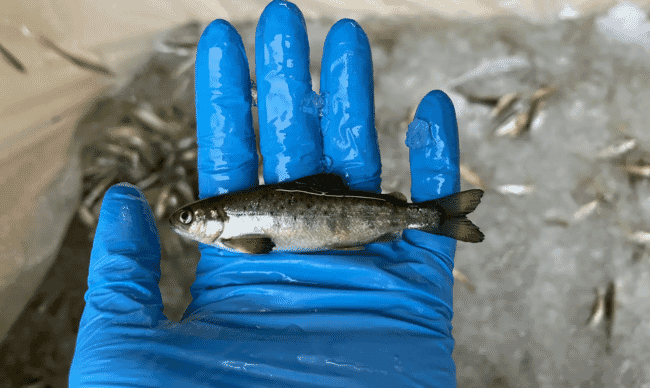
The fish were previously anaesthetised, which meant that they couldn't go back into the food chain © Tiny Fish
Called Tiny Fish, the startup was founded by Jarl van den Berg, general manager at Landcatch Natural Selection, and aims to find unique markets for juvenile salmon that are removed from hatcheries prior to transfer of the best fish to sea pens.
Currently the smallest salmon are euthanised with anaesthetics and removed from the population, as they will be too small to be successfully transferred to sea. These small fish are typically repurposed into biogas or compost as the use of anaesthetics prevents them from being consumed for nutritional purposes.
Tiny Fish is addressing this issue by euthanising the fish with an instant electrical shock, offering high efficacy regarding fish welfare and slaughter, and working to ensure that every fish can be harvested and sold for nutritional purposes.
For this innovation, Tiny Fish has been named a finalist in the Global Seafood Alliance’s Responsible Seafood Innovation Awards in the aquaculture category. Three finalists from the fisheries and aquaculture categories will present at the Responsible Seafood Summit on 22 October in St Andrews, Scotland. Attendees will determine the winner by poll.
A four year project
Jarl van den Berg, a co-founder of Tiny Fish, told the the Global Seafood Alliance's Advocate newsletter that the initiative began four years ago during a brainstorming session with aquaculture technology specialist Ace Aquatec to find a solution to humanely harvesting juvenile salmon.
“Ace Aquatec had built the technology, but unfortunately, it lay dormant because there was no supply chain set up around it,” he said. “Meanwhile, we hatchery managers became increasingly frustrated at seeing our fish go to non-value-added products. But just because these fish are too small to be successfully transferred to sea, it doesn’t mean that they cannot be used in other ways.”
Following stunning with the Ace Aquatec Smolt & Juvenile A-HCS, Tiny Fish harvests, collects, freezes, packages and stores the fish for a range of customers who are interested in an entirely new product line in the industry. The customers include zoos, aquariums and anglers, while another key client is pet food suppliers that buy the fish either whole or minced. The fish can also be freeze-dried and packaged in small pouches as treats for dogs and cats. In this way, smaller fish find purpose as a highly nutritious product that can be harnessed for new revenue streams.
The first companies to embrace the initiative were Mowi and Scottish Sea Farms. Subsequently, Bakkafrost and Cooke Aquaculture joined. Tiny Fish has also received requests to support domestic trout farms.
“Salmon producers in Scotland have provided us with their juvenile fish because we, in turn, give them an opportunity to do what is best,” van den Berg said. “Compared to the alternative, this is more sustainable, circular, an improvement on fish welfare, and above all, cheaper. We hope that it will snowball. It’s something that will only work if everyone comes together, and we are grateful for all the support that we have received. This has given us a lot of joy and motivation to continue. Of course, we hope that every single fish can be transferred to sea and reach a market size of around five kilograms, but for those that stay behind, we can find a good purpose for them as well. At the end of the day – every fish counts.”




